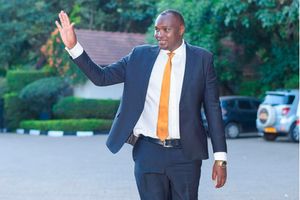
A police vehicle outside the business premises painted with National Police Service colours in Kesses Constituency of Uasin Gishu County on March 10, 2025.
Chutzpah is the word that comes to mind when considering the extreme self-confidence and daring that drives some people in this part of the world to attempt feats that defy the imagination.
Long before Collins Leitich established a private police station in Cherus Market of Kesses in Uasin Gishu County, complete with holding cells for suspects and a Probox painted in police colours, Joshua Waiganjo had been acquitted of impersonating the assistant commissioner of police in a case that ran for 11 years until its collapse last year.
Some 10 years ago, Ronald Melly had performed eight successful surgeries with one fatality at the Kapsabet County Referral Hospital, Nandi County, before he was transferred on promotion to head the Meteitei Sub-County Hospital. It turned out that he had neither medical training nor any education in surgery.
Whatever it is that drives these people, it is not in the water. Brian Mwenda, Kenya’s Mike Ross — so named after the fraud lawyer in the series Suits — won 26 cases at the magistrates’ courts, High Court and Court of Appeal — including one in which he was representing himself as a lawyer. In both Melly and Mwenda’s cases, public opinion was united in suggestions to appreciate the talents of the two youth by recognising their practical experience as prior learning.
The Kenya Qualifications Authority estimates that at least one-third of all certificates in Kenya are fake. So severe is the qualifications crisis in the country that a couple of years ago, the Public Service Commission invited civil servants with dubious academic certificates to leave quietly and avoid public embarrassment of dismissal and possible charges.
Fake academic certificates
A Public Service Commission report issued last year showed that more than 53,599 government workers had fake academic certificates.
Only last week, the Commission for University Education flagged 15 institutions for operating illegally in Kenya, and that academic certificates issued by these institutions would be deemed fake. We shall return to these citadels of learning shortly.
For one to establish a police station, or operate on nine patients, or even argue 26 cases in court, their environment must nurture their duplicity. A material scarcity in the face of great demand can culture fakery: shortage of doctors in places where there are many patients; dearth of law enforcement in habitats beset by crime; and absence of legal aid at sites of grave injustice.
Fakery has, unfortunately, become a Kenyan art form, rippling through the country’s politics, society and professions like a tidal wave. A few politicians with questionable academic papers have faced criminal charges, which never deliver a conclusive decision, but many continue to scale the rungs of power unperturbed. It is just another hustle, valourised through conflation with the jua kali (artisan enterprise), hence the rise of the counterfeit cottage industry that thrives away from official tax administration such as liquified petroleum gas refillers (gas mwitu), and second-generation fertilizer and alcohol versions of high-end brands.
When this widespread prevalence of fakery seeps into the knowledge and information ecosystem, it poses a graver danger than the mere public moral dilemma on whether to punish its perpetrators or reward their audacity. When fakery is deployed in the knowledge economy, truth and morality become relative, thus sowing mistrust and suspicion. This is where it does the greatest social damage.
38 public universities
Kenya has 38 public universities, 30 private ones, and 30 others operating under an Interim Letter of Authority. With student populations anywhere between 563,000 and 700,000, universities are a veritable market for knowledge products — such as books —if they are still in business of teaching and research. Yet, much of the instructional material is, however, acquired through piracy because of high taxes on books and weak enforcement of copyright laws.
Publishers reckon that they lose Sh4 in every Sh10 to book pirates. Parents with children at lower levels of learning spend a fortune on course and supplementary books, on which value added tax has been imposed. Many people buying books — or even seeking information online — lack sufficient literacy to distinguish between fakery and the genuine article. They are thus unprepared to appreciate the benefits of protecting copyright or legitimate authority for that matter – especially when it seems to cost them more.
The value of authentic information can seem facetious until one is confronted with its effects. Last month, Foreign Affairs Principal Secretary Korir Sing’oei apologised for reposting a deepfake AI-generated video purporting to support Kenya’s activity in hosting the Rapid Support Forces rebels from Sudan. If Russia seems to be prevailing in its war with Ukraine, it is thanks in no small part to its disinformation campaign. So, while wars will be waged with sophisticated weaponry, the control of public sentiment through the information they receive to construct their reality is a critical canvas against which battles will be fought.
Writing in the American Journal of Public Policy and Administration on ‘Determinants of Book Piracy in Nairobi County’, Peter Igesha, Daniel Muia and Lucy Maina, note that creativity and intellectual property are susceptible to damage and destruction when they are not protected and rewarded. Nowhere is the struggle for information integrity more pitched than in the academy, where minds are shaped and conditioned towards national duty.
The writer is a board member of the Kenya Human Rights Commission and writes in his individual capacity. @kwamchetsi. [email protected]






